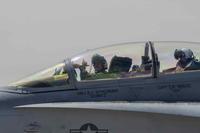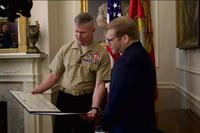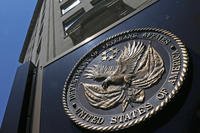The Air Force general who stepped forward to correct the service's nuclear command following the storm of criticism it received when a unit lost track of six nuclear warheads will retire Friday following his command of the intercontinental ballistic missile fleet.
Maj. Gen. Donald Alston was thrown into the spotlight in February 2008 when Air Force Secretary Michael Donley and Air Force Chief of Staff Gen. Norton Schwartz assigned Alston to take command of the Air Force's Nuclear Task Force assigned to fix a decade's worth of neglect to the service's nuclear fleet.
“Don Alston was one of the earliest champions of the Air Force’s reinvigoration of the nuclear enterprise. From directing the Air Force Nuclear Task Force, to serving as the first assistant chief of staff for strategic deterrence and nuclear integration, to commanding 20th Air Force, Don has led the way in ensuring our Air Force provides our nation with the essential umbrella of nuclear deterrence," Schwartz said in a statement to Military.com. "Suzie and I congratulate Don and Ana, and thank them for their boundless energy, generosity, and singular commitment to service.”
Alston faced a steep task at one of the service's most embarrassing moments in its history. He had returned from a Iraq deployment in September 2007, one month after a B-52 aircrew unknowingly flew six nuclear warheads from North Dakota to Louisiana and then left them on the flight line improperly guarded for hours.
Former Defense Secretary Robert Gates fired the Air Force's secretary and chief of staff after a further investigation revealed the Air Force and Defense Logistics Agency had mistakenly shipped four nuclear triggers to Taiwan in 2006 and left them there out of U.S. control for two years.
Gates said he had lost faith in Air Force leadership's ability to lead such an eroded nuclear enterprise. Military and national leaders took turns ripping the service in the proceeding Congressional hearings. Alston had to fix not only the Air Force's eroded nuclear operations, but also the trust and perception the service could handle the responsibility.
He met the media head on when many Air Force leaders scurried to the shadows choosing to meet with journalists rather than hiding behind carefully worded canned statements. He spoke frankly about how far his service had fallen and exactly how it could be fixed.
Shortly after service leaders released the Air Force's Nuclear Roadmap that Altson had overseen, Schwartz tapped him to take over as the service's first ever assistant chief of staff for strategic deterrence and nuclear integration. Before, the Air Force had not had one general in place in the Pentagon to oversee its many arms of the nuclear enterprise.
Upon taking command Alston helped direct the stand up of Air Force Global Strike Command that now houses the service's nuclear capable bombers and ICBMs. He insisted the service challenge its nuclear units to complete more challenging, no-notice inspections. These changes left the service with more negative headlines as many of its nuclear wings failed the new inspections, but Alston said at the time they were necessary to regain the nation's trust.
Alston will step down as commander of Air Force Global Strike Command's 20th Air Force and U.S. Strategic Command's Task Force 214 Friday 34 years after earning his commission from the Air Force Academy and entering ICBM combat crew training in the midst of the Cold War. His retirement will be official Sept. 1.
Gen. Robert Kehler, head of U.S. Strategic Command, will speak at the retirement ceremony held Friday at Cheyenne Air Force Base, Wyo. Alston and his wife, Ana, plan to retire to the Cheyenne area.








